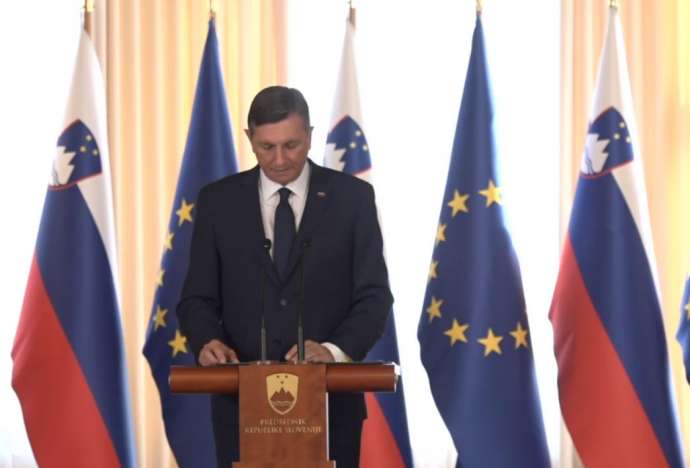STA, 25 February 2022 - President Borut Pahor offered a formal apology on Friday to the 25,671 people who were erased from Slovenia's register of permanent residents 30 years ago. He said this had been an unconstitutional act, a violation of human rights and apologised for all the "wrongs and suffering" it had caused.
"Please accept my sincere apologies on my behalf and on behalf of the state for the unconstitutional act of erasing you from the register of permanent residents, for the violation of your human rights and for all the injustice and suffering that this act caused you and your families," Pahor said at today's ceremony at the Presidential Palace.
The president also expressed deep regret at "the losses you suffered as a result of the erasure, in your relationships with your loved ones, in your property and in the opportunities that could have turned your life around for the better".
"Today we are also taking moral responsibility for the unconstitutional act of erasure, and we are committing it to our collective historical memory," he said.
"I regret that you had to wait far too long for action to be taken to redress the wrongs done to you, even after decisions were adopted by the courts. I am aware that the measures only went so far to address the issues and that many of you are still suffering the consequences of the erasure.
Obeležitev 30. obletnice izbrisa oseb iz Registra stalnega prebivalstva RS #STAvživo @vzivo_si https://t.co/lglDnKkgC5
— STA novice (@STA_novice) February 25, 2022
"I realise that an apology will not make up for what you lost by being erased. By no means," the president said.
"However, today, we are putting an end once and for all to an era of denial and a failure to acknowledge all the suffering and all the grave, tragic consequences of the erasure that are still ongoing."
The president clearly stated that the erasure of 25,671 people, including 5,360 children, from Slovenia's register of permanent residents had been an "arbitrary and unjust act, it was illegal, unconstitutional and discriminatory, and it constituted a violation of human rights".
According to Pahor, the erasure denied people the legal basis for the right to work, the right to healthcare and social protection, the right to higher education and the right to buy a home.
Many were expelled from the country, and many families were separated. Many fell ill, and some even died prematurely without access to healthcare services, he noted.
"Because the erasure was carried out quietly, without informing those affected, in the first years following the erasure they could not understand why they were suddenly, without explanation, no longer able to support their families, go to their parents' funeral, or return to Slovenia, to their homes, after visiting relatives."
Pahor said he wished he could conclude his apology with an assurance that this would never happen again. "The erasure, as well as other events in our vicinity, show us that the rule of law and human rights cannot be taken for granted, that they must be constantly watched over and constantly fought for."
He urged all national and local authorities, as well as civil society institutions that are able to do so within the scope of their tasks and powers, to keep the memory of the erasure and the erased alive, to protect the rule of law and human rights as "our constant and shared concern is that such a thing should never happen again".
He also called on all future governments and all relevant institutions to protect and enable the independence of the judiciary, independent institutions, guardians of democracy, to respect the independence of the media, and to provide space and mechanisms for civil society to function.
Irfan Beširović, head of the Civil Initiative of Erased Activists, said today was a new day for the erased. But he warned that all injustices had not been eliminated yet and that the erased still lived without a proper status in Slovenia.
"Finally, after 30 years of agony, humiliation, we have received an apology from the state," he said, thanking the president.
He believes the apology means a recognition of the erasure and its consequences. "It is not a victory, but for me personally it is a moral victory that we have witnessed it."







